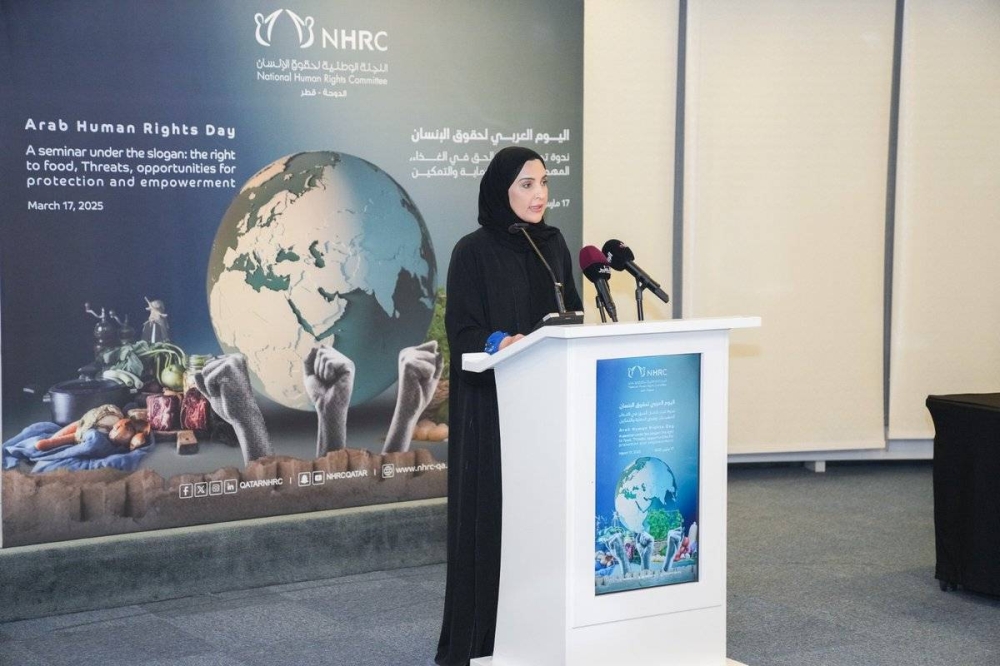
The State of Qatar has taken many moves to implement the right to food, said HE National Human Rights Committee (NHRC) Chairperson Maryam bint Abdullah Al Attiyah, highlighting the National Food Security Strategy 2030, which takes into account dimensions of human rights, sustainable development, and climate change.
HE Al Attiyah's remarks came at a NHRC-organized seminar the UN Human Rights Training and Documentation Center for the South-west Asia and the Arab Region, coinciding the Arab Human Rights Day. Some UN offices accredited in the State of Qatar were present.
The NHRC encourages humanitarian initiatives and programs of various institutions in the country, such as the Qatar Fund for Development, the Qatar Red Crescent, Qatar Charity, and other institutions that have played an effective role in enabling millions of people around the world to obtain food, especially in areas of armed conflict and natural disasters, Her Excellency said.
She added that the seminar aligns with the NHRC's contributions in the State of Qatar, which enhance the enjoyment of the rights stipulated in the Arab Charter on Human Rights and other international treaties.
Al Attiyah added that the threats facing food security worldwide require concerted efforts among various actors at all levels to achieve Sustainable Development Goal 2 - a pivotal goal that overlaps with all development goals, just as the right to food is integrated with other rights, primarily the right to life.
She stressed the importance of addressing challenges by investing in latent energies and disseminating best practices and experiences.
Among the speakers was Director of the UN Training and Documentation Centre for South-West Asia and the Arab Region Dr. Abeer Al Khraisha, who said that the right to food is an integral part of the human rights system.
Therefore, discussing food justice must be undertaken from a comprehensive perspective that takes into account the close interconnectedness between various rights and the obligations of states and the international community, added Al Khraisha.
She added that the UN human rights mechanisms provide a strong framework for promoting and protecting the right to food, noting that through special rapporteurs, such as the Special Rapporteur on the Right to Food, the Universal Periodic Review mechanisms, and the treaty bodies responsible for implementing international agreements, the challenges facing states in ensuring the realization of this right are highlighted, and recommendations are made to support national efforts in this area.
Al Khraisha commended the NHRC's leading endeavors including the right to food, through its effective initiatives and partnerships with various stakeholders, reflecting its firm belief in the importance of highlighting human rights issues at the nationally and regionally.
Meanwhile, World Health Organization (WHO) Representative in Doha Dr Rayana Bou Haka called for solidarity with both Sudan and the Gaza Strip, noting that reports of famine and deteriorating conditions in both countries portend a grave humanitarian catastrophe.
This is especially true given that response mechanisms face unprecedented challenges, as well as the disruption of established response systems, a lack of global funding, and the fact that many donor countries around the world are diverting their attention to arms purchases instead of funding humanitarian programs, threatening to halt humanitarian work in many places, she added.
Bou Haka added that conflicts and natural disasters are pushing millions of people into the abyss of food insecurity and famine, with international humanitarian law and agreements in force for more than 75 years being openly violated.
On the sidelines of the seminar, a book on the right to food amid climate challenges by HE NHRC Vice Chairman Dr. Mohammed bin Saif Al Kuwari was released.
Al Kuwari said the book is one of the fruits of building knowledge and raising public awareness of climate risks to the right to food, including reshaping people's attitudes and actions regarding mitigating greenhouse gas emissions and adapting to risks.
He pointed out that the book presents urgent and ambitious measures to address the impacts of climate change and the enjoyment of the right to food. It also recognizes the interconnected relationship between climate and food, and more strongly integrates the natural, social, and economic sciences into climate change assessments to effectively restore degraded ecosystems and conserve natural resources.
The book also offers new insights into climate risks, improves people's lives, and achieves sustainable development, Al Kuwari added.
In the same context, the NHRC organized a discussion panel on the efforts to empower and protect the right to food. The panel brought together UNDP Technical Representative and Head of Doha Office Biplove Choudhary, Dr Rayana Bou Haka, NHRC's Legal Affairs Department Director Nasser Marzouq Sultan Al Marri and Deputy Director of the UN Training and Documentation Center for South-West Asia and the Arab Region Ishraq Al Zain. (
